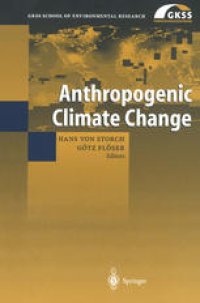
Ebook: Anthropogenic Climate Change
- Tags: Meteorology/Climatology, Environmental Monitoring/Analysis
- Series: GKSS School of Environmental Research
- Year: 1999
- Publisher: Springer-Verlag Berlin Heidelberg
- Edition: 1
- Language: English
- pdf
GKSS SCHOOL OF ENVIRONMENTAL RESEARCH The National Research Laboratory GKSS (member of the Hermann von Helmholtz-Association of German Reserach Centres) located in Geesthacht, near Hamburg, is engaged in environmental research. The main interest of the research center focuses on regional climatology and climate dynamics, interdecadal variations in the state of the Baltic and North Sea and related estuaries, and the flow ofheavy metals, nutrients, and other materials in river catchments to the coastal zones. This research aims at-developing an under standing ofchanges in the environment, both as a result ofinternal (natural) dynamics and as a result of anthropogenic interference. In an effort to dis seminate the results of these research activities, as well as to initiate a broad discussion among senior scientists in the field, and younger colleagues from all areas of the globe, the Institutes of Hydrophysics and Atmospheric Physics at GKSS have instituted the GKSS School of Environmental Research. Appliedenvironmental research has always containedanelement ofaware ness ofthe societal implications and boundary conditions associated with en vironmental concerns. Consequently, the School of Environmental Research adheres to the philosophy that all discussion regarding environmental change should incorporate a social component. This necessity has been well acknowl edged and is apparent by the incorporation ofsocial scientists into the series of lectures. Senior scientists from Europe and North America were invited to give lectures to "students" from all parts of the globe.
The present volume contains lectures given at the First GKSS School of Environmental Research in April 1997. The School dealt with the prototypical problem of Anthropogenic Climate Change and addressed a wide spectrum of questions, ranging from purely dynamic aspects to the socioscientific construction of the "climate problem". Three lectures deal with the functioning and modeling of the climate system and the dynamics behind natural and anthropogenic climate change. An up-to-date discussion of the "detection" problem is given. For comparison, the case of anthropogenic rain-making is addressed which attracted considerable interest in the 1960s. Three lectures deal with the social dimension of Anthropogenic Climate Change, namely with the interaction of climate and economy and the design of optimal policies; a comparison of the present public views with the concept of climatic determinism; and the views held within the scientific community about the role of science.